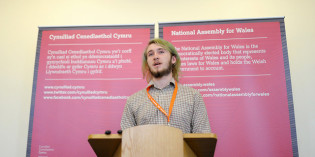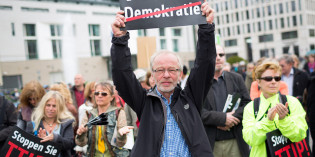Achieving accountable government

The line between secrecy and openness cannot be done away with, but where it is drawn is of crucial importance
In May 2013, an obscure contractor for the US National Security Agency, Edward Snowden, released information regarding the scale and breadth of US surveillance operations. This has had ramifications in Britain, too, where similar practices have been employed by UK GCHQ. Here, Bernard Keenan breaks down the different elements of the concept of “secrecy” that were highlighted by […]

Poor visibility and design flaws are hampering the participatory potential of the European Citizens’ Initiative
The European Citizens’ Initiative was introduced with the Treaty of Lisbon with the aim to improve and expand participation in European Union policy-making. Sergiu Gherghina and Adriana Groh argue that its potential is being hampered by poor citizen knowledge of the initiative, and multiple design flaws. Introduced in April 2012 as the world’s first element of transnational participatory […]

The Scottish Parliament is leading the way on the issue of lowering the voting age to 16
The voting age for UK elections – with the exception of the Scottish Independence referendum – is fixed at 18, however many campaigners and experts feel that the time has come to lower it to 16, in order to enfranchise young people while they live in settled communities, and to prevent a situation in which […]

The European Parliament’s transnational party groups are surprisingly cohesive, but don’t underestimate the potential for national divisions
Members of the European Parliament (MEPs) do not sit in country blocs, rather they sit in pan-European ideological party groupings. But how cohesive are these groups? Rory Costello and Robert Thomson argue that they are remarkably so – but that the potential for divides along national lines is great, particularly with MEPs who share a […]

The ‘Anderson Report’ on surveillance powers does fudge the issues, but its findings should be implemented
David Anderson, a QC, the Independent Reviewer of Terrorism Legislation, recently published a report on the governments surveillance activities in the wake of the Snowden revelations, which showed a far higher degree of unwarranted data collection than most had previously thought. Andrew Wheelhouse argues that though the report does fudge the issues to an extent, […]

Interview: Peter Parycek on artificial intelligence, dystopia, and democracy’s digital future
Does digital have the potential to completely transform our systems of politics and government, and if so to what extent? One of the people at the forefront of answering this question is Peter Parycek, the Chair of the International Conference for E-Democracy and Open Government 2015, and Head of the Centre for E-Governance at Danube University, […]

MEPs’ opposition to the EU-US trade deal is being scandalously silenced
Faced with a possible shock rejection of the Transatlantic Trade and Investment Partnership (TTIP) by MEPs, Brussels simply cancelled the vote this week. Now, the powers that be in Washington have moved swiftly to speed up the publicly unpopular trade deal. Molly Scott Cato, one of those MEPs, argues that the European Parliament, as the only elected part […]

Electoral bias in the UK after the 2015 General Election
Most discussion of the UK’s 2015 election so far has focussed on the unexpected Conservative majority. But Charles Pattie and Ron Johnston reveal another remarkable story hidden just below the surface. The electoral system not only deals unfairly with the smaller parties. It is also biased in how it treats the Conservatives relative to Labour. But the […]




 Democratic Audit's core funding is provided by the Joseph Rowntree Charitable Trust. Additional funding is provided by the London School of Economics.
Democratic Audit's core funding is provided by the Joseph Rowntree Charitable Trust. Additional funding is provided by the London School of Economics.